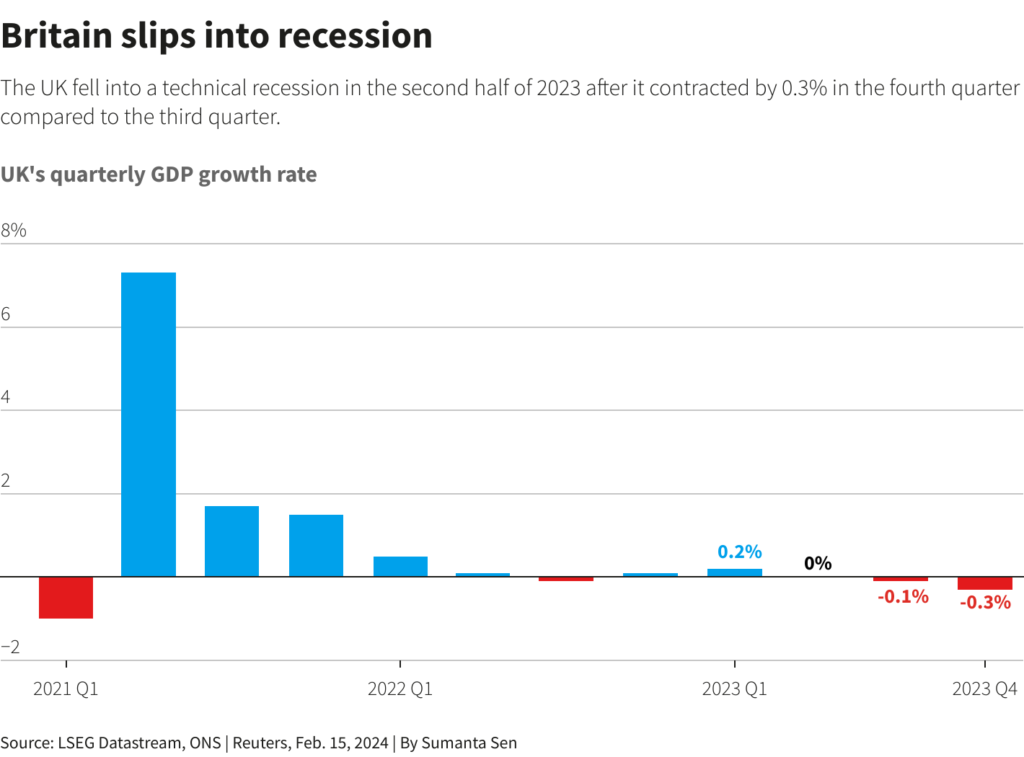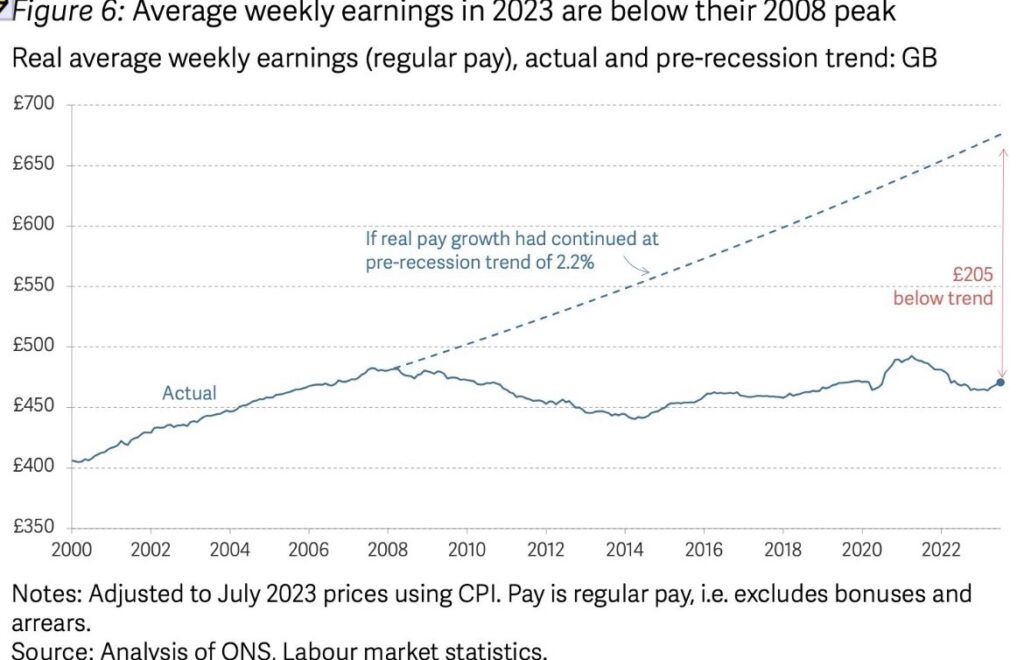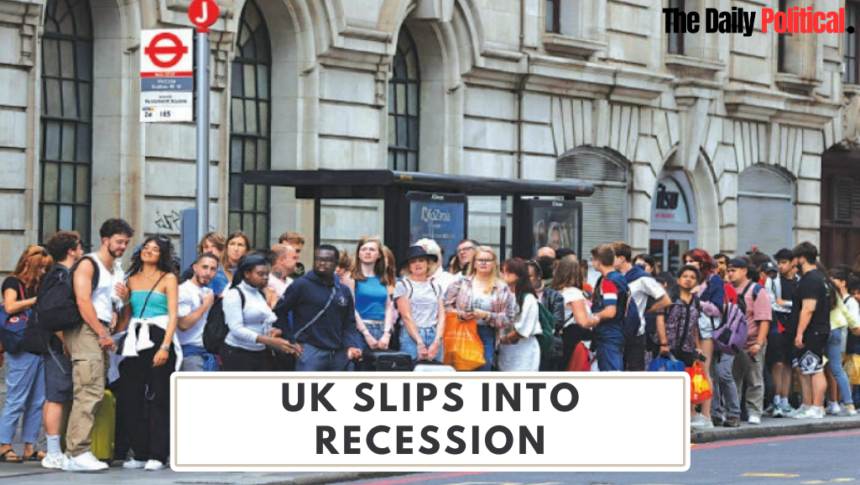New Delhi, India, February 16 : The recent confirmation of the “UK slips into recession” has sent shockwaves through the nation, sparking economic anxieties and intensifying political scrutiny. While technically mild compared to past downturns, this news carries significant weight, demanding a nuanced analysis of its causes, consequences, and potential solutions.

Why UK Slips into Recession : A Closer Look
While the UK recession may be technically mild, the factors leading to it paint a complex picture:
1. Cost-of-Living Squeeze:
- Energy Shock: Due to the global energy crisis, gas and electricity prices have skyrocketed. The average household saw a 54% increase in energy bills compared to the previous year, leaving less disposable income for other essentials.
- Food Price Inflation: Global supply chain disruptions and the war in Ukraine have pushed up food prices by an average of 14%. This disproportionately impacts low-income households who spend a larger share of their budget on food.
- Stagnant Wages: Although wages have seen some growth, it hasn’t kept pace with inflation, leading to a real-terms decline in income for many workers. This shrinks demand further, impacting businesses and hindering economic growth.

2. Global Inflation:
- Imported Pressures: As inflation is a global phenomenon, rising prices for international goods add to the domestic cost burden, further eroding purchasing power.
- Tightening Global Financial Conditions: Central banks worldwide are raising interest rates to combat inflation, leading to more expensive borrowing costs and potential capital flight from emerging markets like the UK.
3. Rising Interest Rates:
- Bank of England’s Dilemma: To curb inflation, the Bank of England raised interest rates to their highest level in 16 years. While necessary, this increases borrowing costs for businesses and individuals, dampening investment and consumer spending.
- Mortgage Burden: Higher interest rates translate to higher mortgage payments, squeezing household budgets and potentially impacting the housing market.
4. Industrial Action:
- Disruptions across Sectors: Strikes in public sectors like healthcare and transportation have caused economic disruptions, impacting productivity and service delivery.
- Underlying Issues: These strikes highlight deeper issues like understaffing and low wages, demanding broader solutions to prevent future disruptions.
UK Slips into Recession : Consequences and Concerns:
- Living Standards Decline:
- Shrinking GDP: A decline in GDP signifies a shrinking national economy, translating to reduced productivity and income. This leads to lower real wages, impacting household purchasing power and overall well-being.
- Rising Poverty: With rising costs and stagnant wages, more households are slipping into poverty, increasing the reliance on social safety nets and putting pressure on public services.
- Widening Inequality: The cost-of-living crisis disproportionately impacts lower-income groups, exacerbating existing inequalities and creating social challenges.
Pound to Euro Exchange Rate Hits 10-Day Low as UK Enters Recession https://t.co/ycJgMRZtNZ
— Exchange Rates UK (@exchangeratesuk) February 16, 2024
2. Political Pressure:
- Broken Promises: The Conservative government’s pledge to grow the economy stands unfulfilled, potentially damaging public trust and eroding their voter base.
- Opposition Opportunity: The Labour Party and other opposition groups can leverage the economic situation to criticize the government’s performance and gain electoral support.
- Policy Uncertainty: The need to address the recession may lead to policy changes or delays, creating uncertainty for businesses and investors.
3. Business Uncertainty:
- Investment Hesitation: Economic stagnation discourages businesses from investing in expansion and innovation, hindering long-term growth prospects.
- Hiring Freeze: Companies are cautious about hiring new employees, potentially leading to job losses and increased unemployment.
- Supply Chain Challenges: Rising costs and global disruptions add to existing supply chain difficulties, impacting production and profitability.
UK Slips into Recession : Potential Solutions
- Targeted Support:
- Energy Price Cap Adjustments: Revising the energy price cap can provide immediate relief to households struggling with high bills.
- Targeted Subsidies: Providing targeted subsidies to low-income families and pensioners can help them meet basic needs and maintain their standard of living.
- Food Bank Support: Strengthening and expanding food bank networks can alleviate food insecurity for vulnerable populations.
Retail sales volumes (quantity bought) rebounded 3.4% in January 2024, following a record fall of 3.3% in December 2023.
— Office for National Statistics (ONS) (@ONS) February 16, 2024
This was the largest monthly rise since April 2021 and returned volumes to November 2023 levels.
➡️ https://t.co/ipWNHoU3do pic.twitter.com/4d1LyKkEoP
2. Growth-Oriented Policies:
- Skilling and Upskilling Initiatives: Investing in skills development can improve worker productivity and equip them for better-paying jobs, boosting long-term growth.
- Innovation and Technology Focus: Encouraging research and development in key sectors like clean energy and digital technologies can drive future economic competitiveness.
- Infrastructure Investment: Targeted infrastructure projects can create jobs, stimulate economic activity, and improve long-term productivity.

3. Sustainable Fiscal Policy:
- Targeted Spending Reviews: Carefully reviewing public spending across departments can identify areas for efficiency gains and free up resources for crucial investments.
- Progressive Taxation: Implementing progressive taxation systems can ensure a fairer distribution of resources and help raise funds for social programs.
- Debt Management: Maintaining responsible debt management practices is crucial to ensure fiscal sustainability and investor confidence.
4. Collaboration:
- Social Dialogue: Open communication and collaboration between government, businesses, unions, and civil society can generate consensus and foster solutions that address diverse needs.
- Transparency and Accountability: Transparent communication about economic challenges and plans for recovery is vital to maintain public trust and encourage cooperation.
- International Cooperation: Working with international partners to address global challenges
.
The UK’s economic slump presents a challenging, but not insurmountable, obstacle. Recognizing the complex interplay of factors, prioritizing both immediate relief and long-term solutions, and embracing collaborative approaches are paramount in navigating this difficult period. By acknowledging the gravity of the situation and taking responsible action, the UK can emerge from this recession stronger and more resilient.







